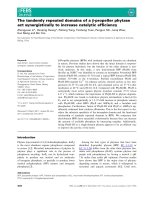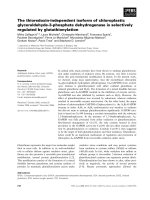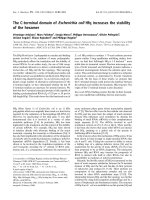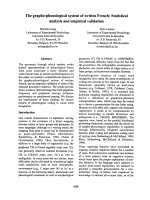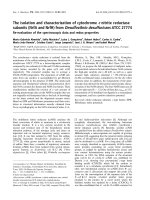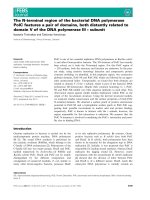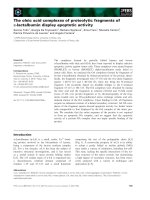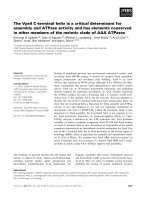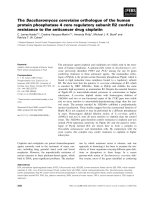báo cáo khoa học: " The public health utility of genome-wide association study results for smoking behavior" docx
Bạn đang xem bản rút gọn của tài liệu. Xem và tải ngay bản đầy đủ của tài liệu tại đây (235.89 KB, 3 trang )
Introduction
Cigarette smoking is the largest preventable cause of
morbidity and mortality in the world. Despite best
available treatments, smoking cessation remains an elusive
goal for most smokers and relapse is normal. Cigarette
smoking behavior is influenced, in part, by genetic factors
[1]. Incorporating smoking-related genetic risk infor-
mation into clinical practice has the potential to increase
smoking cessation rates and improve public health. Here,
we discuss the clinical implications of emerging findings
from genome-wide association studies (GWASs) for
smoking behavior and pharmacogenetic trials of cessa-
tion treatments. We suggest that research from multiple
disciplines should be conducted in parallel to bring us
closer to the goal of delivering personalized cessation
treatment for smokers.
GWASs of smoking behavior
Since 2007, several GWASs among individuals of Euro-
pean ancestry have been conducted for different smoking
phenotypes, including smoking initiation (ever versus
never smokers), age of smoking initiation, number of
cigarettes smoked per day (CPD), nicotine dependence
(based on the Fagerström test for nicotine dependence
score), smoking cessation (former versus current smokers),
pack-years and duration of smoking (see Supplementary
Table 1 in [2]). Most recently, meta-analyses were con-
ducted among 143,023 individuals of European ancestry
[2-4]. Remarkably, whereas previous GWASs for other
complex traits with far smaller sample sizes had discovered
multiple novel variants, only one locus on chromosome
15, which harbors the cluster of nicotinic acetylcholine
receptor genes CHRNA3-CHRNA5-CHRNB4, has been
robustly associated with CPD across multiple GWAS of
smoking [2-7]. e single nucleotide polymorphism (SNP)
rs1051730 was identified as being most strongly associated
with CPD; each copy of the variant allele (allele frequency =
0.35) was estimated to increase smoking by approximately
one cigarette per day and accounted for only 0.5% of the
variance in CPD [2].
e statistical power bestowed by the tremendous
sample sizes of the GWAS meta-analyses for smoking
effectively exclude the potential of identifying large effects
(>1.5) for common allele frequencies represented on
current GWAS chips. However, additional loci for smoking
behavior can be identified as a result of the improved
genomic coverage of newer GWAS chips and by analyses
of the 1000 Genomes project, which will enable an exten-
sion of systematic GWAS methods to SNPs with 1 to 5%
allele frequencies [8]. In addition, future GWASs that
refine phenotypic characterization of cessation by incor-
porating longitudinal data on prospective quit attempts
and relapses among smokers may reveal loci associated
with quitting smoking. Algorithms that incorporate
multiple risk variants and their interactions also may yield
stronger associations for different smoking behaviors.
Clinical validity of GWAS findings for smoking
Because of their low penetrance and inability to explain
more than a small fraction of observed heritability,
Abstract
New approaches to improve smoking cessation rates
are needed. In recent years, substantial progress has
been made in understanding the genetics of smoking
behavior, and this knowledge may eventually be
used to personalize treatment for smokers. Although
there are highly signicant and reproducible genetic
associations, none are yet ready for clinical applications.
We suggest that translational research from several
disciplines, including behavioral science, ethics and
economics, should be performed in parallel with
ongoing genome-wide association studies for smoking
behavior and pharmacogenetic trials. The coordinated
eort of multidisciplinary research teams will help
reveal the circumstances under which we can translate
genetic insights into clinical practice in the hope of
reducing the burden of smoking in society.
© 2010 BioMed Central Ltd
The public health utility of genome-wide
association study results for smoking behavior
Helena Furberg*
1,2
, Jamie Ostro
1
, Caryn Lerman
3
and Patrick F Sullivan
2
COMM ENTA RY
*Correspondence:
1
Department of Psychiatry and Behavioral Science, Memorial Sloan Kettering
Cancer Center, 641 Lexington Ave, New York, NY 10022, USA
Full list of author information is available at the end of the article
Furberg et al. Genome Medicine 2010, 2:26
/>© 2010 BioMed Central Ltd
individual SNPs identified in GWASs are generally
regarded as lacking sufficient sensitivity, specificity and
predictive value to serve as clinical markers of heightened
risk of nicotine dependence and persistent smoking in
the general population [9]. To translate into a clinically
valid marker, a risk factor has to be very strongly asso-
ciated with a trait. Ware [10] demonstrated that even a
marker with an odds ratio as high as 3.58 will not perform
well as a predictive test for individual patients. Although
we evaluated CPD as a quantitative variable in the GWAS
meta-analysis [2], the observed effect size was not suffi -
ciently large. Furthermore, whether the SNPs identified
in GWASs for CPD are relevant for cessation is unclear.
Although there seems to be partial overlap between some
genomic regions associated with CPD and cessation [11],
SNPs in CHRNA3-CHRNA5-CHRNB4 have not been asso-
ciated with smoking cessation in previous GWASs [2-4].
e effect sizes of SNPs on smoking behaviors may be
larger in the context of gene-environment interactions in
therapeutic clinical trials (pharmacogenetics) [12].
Pharmacogenetic studies of smoking cessation therapies
may help identify subgroups of smokers who respond
more favorably to specific treatments and help determine
their optimal dose and duration of treatment. So far,
pharmacogenetic trials of smoking cessation suggest that
genetic variation in nicotine metabolizing enzymes and
dopamine and opioid pathways may have a role in the
efficacy of nicotine replacement therapy (NRT), whereas
variation in the dopamine pathway may be relevant for
response to the smoking cessation drug bupropion [13].
GWASs in pharmacogenetic studies
In pharmacogenetic studies, GWASs may have even
greater potential to identify loci associated with improved
cessation and, in particular, rare adverse events [12,14].
Preliminary evidence from the first pharmacogenetic
GWAS of smoking cessation [15] suggests that regions
associated with successful abstinence on bupropion or
NRT are not identical, supporting observations from
candidate gene pharmacogenetic studies discussed above
[13], but replication is required. Given the rare but
serious potential psychiatric side-effects of non-nicotinic
pharmacotherapies [16], GWASs of bupropion and other
therapies, such as varenicline, are warranted.
Future directions
Clearly, changes in public policy, including indoor air acts,
increased taxes on cigarettes and bans on tobacco product
advertising, have contributed significantly to a decrease in
smoking prevalence in the US [17]. However, given that
the prevalence of current smokers seems to be stabilizing,
and existing cessation treatments help only a fraction of
smokers to quit, new tailored approaches for cessation that
involve insights from genetics deserve to be considered.
Although substantial progress has been made in the
genetics of smoking in recent years, more research is
needed. To maximize the potential for personalized
treat ment for smokers, translational research from
multiple disciplines should be conducted in parallel with
ongoing GWASs for smoking behavior and pharmaco-
genetic studies of smoking cessation. Behavioral research
on the uptake, understanding and consequences of
genetic risk communication will increase the likelihood
that future genetic testing of smoking will result in public
health improvements [18] and reduce the likelihood of
harm; such harm could include a lowering of the
motivation to quit or of the self-efficacy for quitting, both
of which could undermine quitting efforts. Research
surrounding the ethical, legal and social implications of
genetic research on smoking [19] will help us handle the
potential discrimination against patients related to
inappropriate use of their genetic information, given the
known co-morbidity between nicotine dependence and
other substance abuse conditions and psychiatric dis-
orders, the possibility of pleiotropic associations and the
differential prevalence of risk-conferring genotypes
among different ancestries. Cost-benefit analyses of
genetically tailored treatment for smoking will contribute
to the feasibility of these approaches. Finally, develop-
ment of genetic testing guidelines for and training of
health care providers is needed to standardize care and
increase their confidence in interpreting and conveying
results to their patients [20].
e coordinated effort of multidisciplinary research teams
that address these complex issues will help inform the
circumstances under which we can translate the genetics of
smoking into clinical practice in the hope of reducing the
burden of smoking in our society. Until the goal of
personalized cessation treatment is realized, all smokers
should be encouraged to quit, regardless of genotype.
Abbreviations
CHRNA, nicotinic cholinergic receptor; CPD, cigarettes smoked per day; GWAS,
genome-wide association study; NRT, nicotine replacement therapy; SNP,
single nucleotide polymorphism.
Competing interests
The authors declare that they have no competing nancial interests.
Authors’ contributions
HF, JO, CL and PFS were involved in drafting the manuscript and have
reviewed and approved the nal version.
Acknowledgements
We thank Jennifer Dackor for her curation of the genome-wide association
studies of smoking behavior and editorial assistance. This work was funded
by the University of North Carolina Lineberger Comprehensive Cancer Center
University Cancer Research Fund Award, and NCI K07 CA118412 to HF.
Author details
1
Department of Psychiatry and Behavioral Science, Memorial Sloan Kettering
Cancer Center, 641 Lexington Ave, New York, NY 10022, USA.
2
Department
of Genetics, University of North Carolina, Chapel Hill, NC 27599, USA.
3
Department of Psychiatry and Annenberg Public Policy Center, University of
Pennsylvania, Philadelphia, PA 19104, USA.
Furberg et al. Genome Medicine 2010, 2:26
/>Page 2 of 3
Published: 27 April 2010
References
1. Rose RJ, Broms U, Korhonen T, Dick DM, Kaprio J: Genetics of Smoking
Behavior. In Handbook of Behavior Genetics, 1. 1st edition. Edited by Kim Y-K.
New York: Springer; 2009: 411-432.
2. Furberg H, Kim Y, Dackor J, Boerwinkle E, Franceschini N, Ardissino D,
Bernardinelli L, Mannucci PM, Mauri F, Merlini PA, Absher D, Assimes TL,
Fortmann SP, Iribarren C, Knowles JW, Quertermous T, Ferrucci L, Tanaka T, Bis
JC, Furberg CD, Haritunians T, McKnight B, Psaty BM, Taylor KD, Thacker EL,
Almgren P, Groop L, Ladenvall C, Boehnke M, Jackson AU et al.: Genome-
wide meta-analyses identify multiple loci associated with smoking
behavior. Nat Genet 2010, doi:10.1038/ng.571.
3. Thorgeirsson TE, Gudbjartsson DF, Surakka I, Vink JM, Amin N, Geller F, Sulem
P, Rafnar T, Esko T, Walter S, Gieger C, Rawal R, Mangino M, Prokopenko I, Mägi
R, Keskitalo K, Gudjonsdottir IH, Gretarsdottir S, Stefansson H, John R
Thompson, Yurii S Aulchenko, Mari Nelis, Aben KK, den Heijer M, Dirksen A,
Ashraf H, Soranzo N, Valdes AM, Steves C, Uitterlinden AG et al.: Sequence
variants at CHRNB3-CHRNA6 and CYP2A6 affect smoking behavior. Nat
Genet 2010, doi:10.1038/ng.573.
4. Liu JZ, Tozzi F, Waterworth DM, Pillai SG, Muglia P, Middleton L, de Berrettini
W, Knou CW, Yuan X, Waeber G, Vollenweider P, Preisig M, Wareham NJ, Zhao
JH, Loos RJF, Barroso I, Khaw K-T, Grundy S, Barter P, Mahley R, Kesaniemi A,
McPherson R, Vincent JB, Strauss J, Kennedy JL, Farmer A, McGun P, Day R,
Matthews K, Bakke P et al.: Meta-analysis and imputation refines the
association of 15q25 with smoking quantity. Nat Genet 2010, doi:10.1038/
ng.572.
5. Bierut LJ, Madden PA, Breslau N, Johnson EO, Hatsukami D, Pomerleau OF,
Swan GE, Rutter J, Bertelsen S, Fox L, Fugman D, Goate AM, Hinrichs AL,
Konvicka K, Martin NG, Montgomery GW, Saccone NL, Saccone SF, Wang JC,
Chase GA, Rice JP, Ballinger DG: Novel genes identified in a high-density
genome wide association study for nicotine dependence. Hum Mol Genet
2007, 16:24-35.
6. Amos CI, Wu X, Broderick P, Gorlov IP, Gu J, Eisen T, Dong Q, Zhang Q, Gu X,
Vijayakrishnan J, Sullivan K, Matakidou A, Wang Y, Mills G, Doheny K, Tsai YY,
Chen WV, Shete S, Spitz MR, Houlston RS: Genome-wide association scan of
tag SNPs identifies a susceptibility locus for lung cancer at 15q25.1. Nat
Genet 2008, 40:616-622.
7. Hung RJ, McKay JD, Gaborieau V, Boetta P, Hashibe M, Zaridze D, Mukeria A,
Szeszenia-Dabrowska N, Lissowska J, Rudnai P, Fabianova E, Mates D, Bencko
V, Foretova L, Janout V, Chen C, Goodman G, Field JK, Liloglou T, Xinarianos G,
Cassidy A, McLaughlin J, Liu G, Narod S, Krokan HE, Skorpen F, Elvestad MB,
Hveem K, Vatten L, Linseisen J, et al.: A susceptibility locus for lung cancer
maps to nicotinic acetylcholine receptor subunit genes on 15q25. Nature
2008, 452:633-637.
8. Manolio TA, Collins FS, Cox NJ, Goldstein DB, Hindor LA, Hunter DJ,
McCarthy MI, Ramos EM, Cardon LR, Chakravarti A, Cho JH, Guttmacher AE,
Kong A, Kruglyak L, Mardis E, Rotimi CN, Slatkin M, Valle D, Whittemore AS,
Boehnke M, Clark AG, Eichler EE, Gibson G, Haines JL, Mackay TF, McCarroll SA,
Visscher PM: Finding the missing heritability of complex diseases. Nature
2009, 461:747-753.
9. Kraft P, Hunter DJ: Genetic risk prediction - are we there yet? N Engl J Med
2009, 360:1701-1703.
10. Ware JH: The limitations of risk factors as prognostic tools. N Engl J Med
2006, 355:2615-2617.
11. Drgon T, Montoya I, Johnson C, Liu QR, Walther D, Hamer D, Uhl GR: Genome-
wide association for nicotine dependence and smoking cessation success
in NIH research volunteers. Mol Med 2009, 15:21-27.
12. Guessous I, Gwinn M, Khoury MJ: Genome-wide association studies in
pharmacogenomics: untapped potential for translation. Genome Med 2009,
1:46.
13. Lerman CE, Schnoll RA, Munafo MR: Genetics and smoking cessation
improving outcomes in smokers at risk. Am J Prev Med 2007, 33:S398-S405.
14. Crowley JJ, Sullivan PF, McLeod HL: Pharmacogenomic genome-wide
association studies: lessons learned thus far. Pharmacogenomics 2009,
10:161-163.
15. Uhl GR, Liu QR, Drgon T, Johnson C, Walther D, Rose JE, David SP, Niaura R,
Lerman C: Molecular genetics of successful smoking cessation: convergent
genome-wide association study results. Arch Gen Psychiatry 2008,
65:683-693.
16. Kuehn BM: Varenicline gets stronger warnings about psychiatric problems,
vehicle crashes. JAMA 2009, 302:834.
17. Levy DT, Romano E, Mumford E: The relationship of smoking cessation to
sociodemographic characteristics, smoking intensity, and tobacco control
policies. Nicotine Tob Res 2005, 7:387-396.
18. McBride CM, Brody LC: Point: genetic risk feedback for common disease
time to test the waters. Cancer Epidemiol Biomarkers Prev 2007, 16:1724-1726.
19. Shields AE, Fortun M, Hammonds EM, King PA, Lerman C, Rapp R, Sullivan PF:
The use of race variables in genetic studies of complex traits and the goal
of reducing health disparities: a transdisciplinary perspective. Am Psychol
2005, 60:77-103.
20. Shields A, Lerman C, Sullivan P: Translating emerging research on the
genetics of smoking into clinical practice: ethical and social
considerations. Nicotine Tob Res 2004, 6:675-688.
doi:10.1186/gm147
Cite this article as: Furberg H, et al.: The public health utility of genome-
wide association study results for smoking behavior. Genome Medicine 2010,
2:26.
Furberg et al. Genome Medicine 2010, 2:26
/>Page 3 of 3
